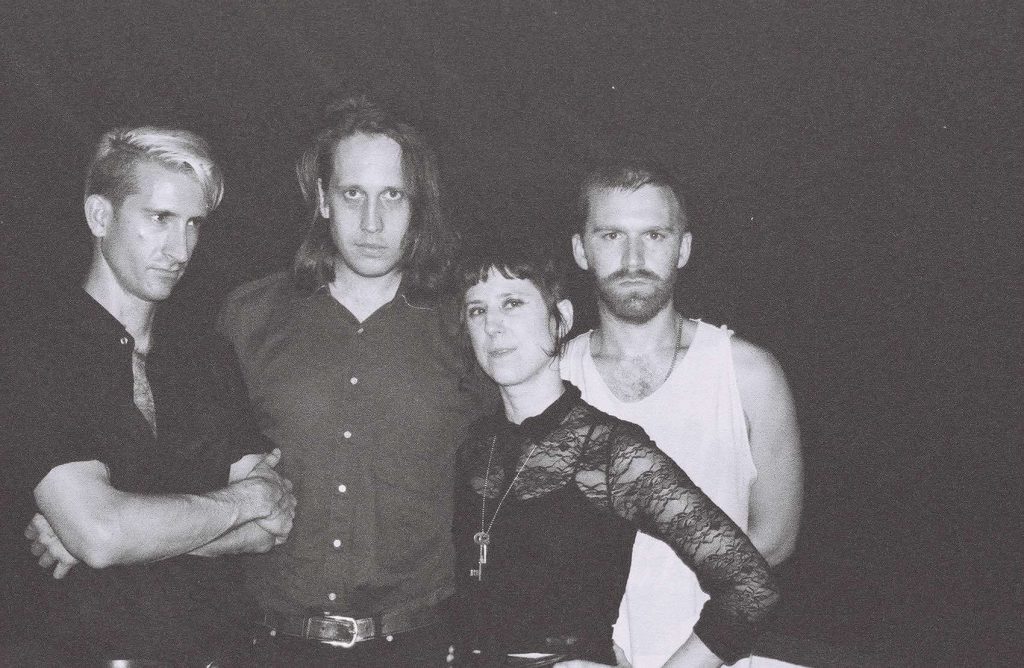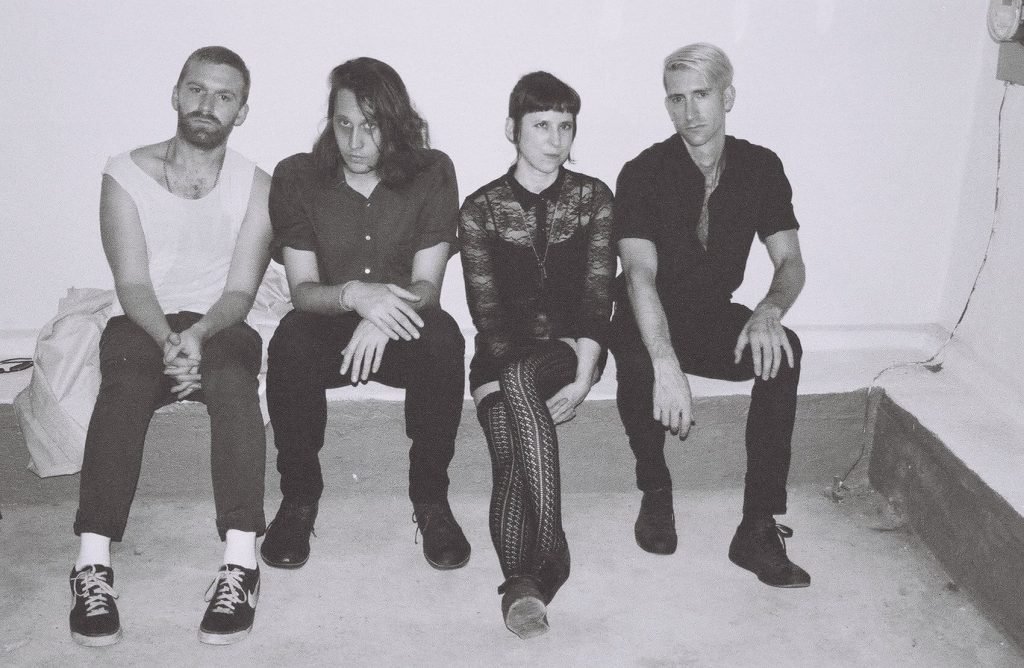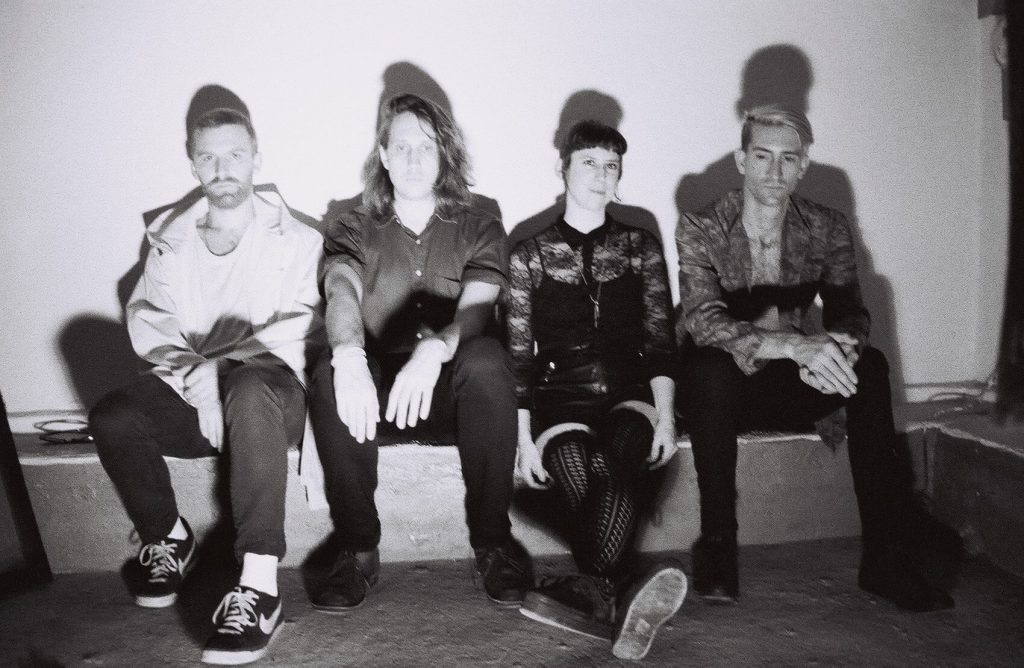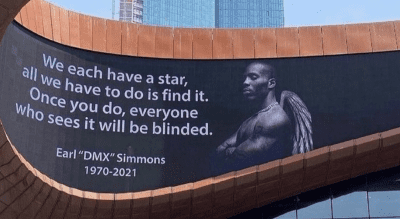Self-Loathing In Paradise: Pop. 1280’s Sci-Fi Punk Chaos
At their album release show at Silent Barn in early February Pop. 1280 is wearing one neglige and three Hawaiian shirts. Chris Bug, the band’s lead singer, is tall and lithe, cut from the same cloth as Bowie’s Thin White Duke. Pop. 1280’s music isn’t built for dancing. Live, it’s meant to overwhelm, to sway, to envelop. Silent Barn, a small DIY space in Bushwick, suddenly feels larger than life. Considering the venue’s use as a multidisciplinary political space, this starts to make sense. Pop. 1280 offers no map to liberation, no joyful victories. There’s a lot of desperate noise. A few weeks earlier at the Capri Social Club in Greenpoint, Bug confirms the distress: “As much as we talk about technology and use it, we cling to the human elements that are left in us.”
Sometimes Pop. 1280 sounds very fast, especially on Paradise their fourth release and third full length that came out in late January. When they do, on songs like “In Silico,” it can sound like nanoprobes infecting your disgusting, insectoid alien body, destroying the electrochemicals in your blood until you collapse on yourself and die. Other times, they sound slow, like on Paradise’s lead single “Pyramids on Mars,” where they create sonic waves that appear out of nowhere, transported from the planet they are singing about. Singing is a huge part of why Pop. 1280 is such a terrific band, the reason why no matter if they’re going fast or going slow, they sound like the end of the world. Chris Bug’s voice is so arresting, so deep and straightforward, that at first you don’t notice the sneer. It comes at the end his declarations, a curl. He sings of technological wonders, of other planets and the fantastical, but that sneer makes it all sound evil, terrible, wrong.


Jane Chardiet
Pop. 1280 are nerds and it comes through in a roundabout way on Paradise. Like its predecessors, the record is a cold, vicious album that deals with how people destroy themselves. Pop. 1280 investigate technology, but that’s not what makes the band nerdy. They engage with technology by noting its neutrality; how people design it to stomp out their own humanity and subsequently confront the tension that we can never truly eliminate that element of ourselves, no matter how hard we try.
“Some of the things I’ve seen written about the record say something about technology,” the band’s lead guitarist Ivan Lip says, “But we’re interested in the relationship between humans and technology. Technology is neither good nor bad. How are humans more succeeding or failing?” Lip notes that pilots manning drone bombings suffer PTSD from the deaths they inflict, and says that played directly into Paradise’s seven-minute epic “In Silico,” where Bug repeatedly yells: “I dream in infrared!” Again, this is not why they’re nerdy. This is a healthy, natural reaction to the American embrace of drone warfare, a burgeoning style of attack that has killed over 3,000 people. They’re nerds because they talk about Star Trek all the time.
Conversation with Bug and Lip can quickly turn to science fiction, although the band is careful to reject any labelling of their music as such. But the two will delightfully go on tangents recommending official Star Trek novels like Imzadi and denouncing the modern J.J. Abrams remakes as “billion dollar dogshit.” They’ll go deep on Star Trek: Deep Space Nine episodes, describing with great specificity the one where Commander Sisko goes back in time and leads a militarized rebellion inside an American prison camp. Bug sees space exploration as “what man was meant to do,” as opposed to our current reality of living in a “Pepsi ad, streaming on an iPad.” The frustrating gap between those two scenarios is what leads to so much of the tension found on Paradise.


Jane Chardiet
Pop. 1280 is signed to Sacred Bones, a local label whose commitment to aesthetics is so strong that it can make acts as disparate as singer-songwriter Marissa Nadler and noise emissary Pharmakon feel spiritually related. The band have been with the label from the beginning, releasing even their initial EP through the label back in 2010. Musicians signed to Sacred Bones often share an investigative sense, be it into the past or hospitalization. Pop. 1280, whose latest t-shirts feature CCTV cameras, peers into a world of their own creation. When asked if they’re part of any music scene in Brooklyn, Bug replies that “everyone thinks we’re assholes, and no one ever asks us to play with them.”
While I thought they were nice enough, Pop. 1280’s idiosyncrasies are readily apparent. They have no time for the past: not only do they have very few words on their origin, (Lip: “Chris and I knew each other since high school. He went to China, I went to NYC. He got tired of China and wanted to work on art. I told him I was interested in starting a new band.”) but each album they make is meant to oppose the one before it. Bug describes their last album, Imps of Perversion, as a rocker: “I was doing high kicks on stage, it felt great. I was wearing a kimono and tights, jumping around in Europe.” Pop. 1280’s current sound does not imply high kicks. It’ll be recognizable to fans of the outsized confrontational sounds of Swans or Cop Shoot Cop. Perversion was produced by Martin Bisi, who has, in fact, worked both of those bands. But in place of, say, Cop Shoot Cop’s horn section, Pop. 1280 has synths, brought forth by Allegra Sauvage. The change brings with it an air of science fiction, and the band’s lyrics make it all feel dystopic in an easy, relatable fashion.
The Grid, the band’s first EP, starts off with a song about public masturbation in New York. Men and women, bridges and subways — it feels dirty, disgusting, filled with rats and sewage, and really hot. The Grid is great for aggressive sex. The Horror, the band’s first full-length out in 2012, picks up on the theme, opening with the line “Two dogs fucking!” Next, came Perversion, their second full-length album which, was August 8th, 2013, barely two months after Ed Snowden’s first surveillance disclosures to The Guardian were published. When discussing the band’s thematic relationship with technology, Bug mentions the incident: “I think I only became able to articulate that tension over the last 3 or so years, especially post-Edward Snowden. The alienation that’s a byproduct of technology is something we’ve always discussed together, but I don’t think it became a powerful thesis until Paradise. The Grid and The Horror were more influenced by our internal alienations that stemmed from social pressures like porn, love, drugs, work, relationships and living in NYC. I think that we’ve been putting lots of puzzle pieces together about the Internet and social media, and about the fascism of the world we live in over the years. Paradise feels like the puzzle is starting to look like a picture, albeit a hideous one.”


Jane Chardiet
“There is a lot of self-loathing, in general, in this band,” Bug continues. “Any accusation we send out to the world, we feel it in ourselves: ‘Are we still doing this? What are we gonna do?’ We spend more and more time developing our fucking smartphone technology, getting Netflix streaming and getting ripped off by Time Warner… and this, this is what it is? Don’t we have any fucking better ideas?” They deal with the same Pepsi ad that the rest of us do. “Am I really doing anything, at the end of the day? All I can really say about myself is that I’m in a band trying to hold up a mirror up to the rest of society and point what I think is wrong with the world, is that enough? Probably not. I could do more. I could sacrifice my comfortable life. And I don’t. I think those feelings of guilt and self-loathing are all over most of our output, but in Paradise specifically.” “On this record,” Lip interjects, “There are a lot of personal questions. The fact of the matter is, all the things we’ve listed, I participate in nine-tenths of them.”
The band also shares the stubbornly human desire not to be labeled. Their sound is so idiosyncratic that it tends to bring out the obscure genres. Although Pop. 1280’s Bandcamp bio claims the band is “cyberpunk,” and a lot of people could listen to their music and feel that makes sense, Lip says that it’s a joke. “If we’re coming off as sci-fi, it’s because most of the lyrics coming out of bands right now are so uninteresting,” he says. The two both visibly recoil when discussing old, positive reviews describing their sound as “pigfuck”—a subgenre invented by Robert Christagu to describe noisy, chaotic acts like The Jesus Lizard and Big Black. “Oh God no,” says Lip. “No offense,” says Bug, “But I chalk it up to laziness and ignorance of music journalists.”
Paradise is notably more digital than their previous records, due in large part to new production and recording styles. “Our drummer, Andrew Chugg recorded it,” Lip says. “He did it in our practice space, the Population Control Center, an underground clinic somewhere in New York City. It yielded a lot of interesting moments. We couldn’t really multitrack in the same way, so it’s actually not a live record at all. We’re never playing in the same room. We’re recording two or three mics at a time. A lot more electronics. I think there’s only acoustic drums — like truly played by a human acoustic drums — on a third of the record. The two of us programmed some drum machines, Andy did some cutting-and-splicing of drum samples.” Another big difference for this record was that the band recorded it themselves over a long period of time. “We recorded this about over a year,” Bug notes. “All our other records were in a studio in two weeks. Some of these songs were recorded last year, or in 2014.” The time allowed for experimentation, of long nights focused on new ideas. “It was chill,” Bug says, “But we are not chill people.”
“Phantom Freighter,” the second track on Paradise, opens with a bouncy little drum machine beat. Lip describes it as a direct influence of industrial dadaists Cabaret Voltaire. It sounds like a bedroom project, small and localized, but then, a sonic boom emits, a cold, twisting synth. The guitars quickly start to punish your ears. It’s one of their fast songs. “Just like you said / I went and did again,” Bug goes, “Made myself sick.’ He starts to sounds like the narrator of Dostoyevsky’s Notes From the Underground, broken down and beyond anything but a piecemeal internal logic. “Life is so long and it’s always this way,” he screams about pulling the plug. It reverberates into oblivion. To say the song has a chorus is overstating the matter, but he does repeat himself a few times; it’s a declaration of purpose and futility — of sinking the ship they’re on because they’ve run out of options. “We’re taking you on and going down with it!” Can’t beat ‘em, won’t join ‘em, but somewhere in the middle, Pop. 1280 finds a place to make your ears bleed.
You might also like 




















